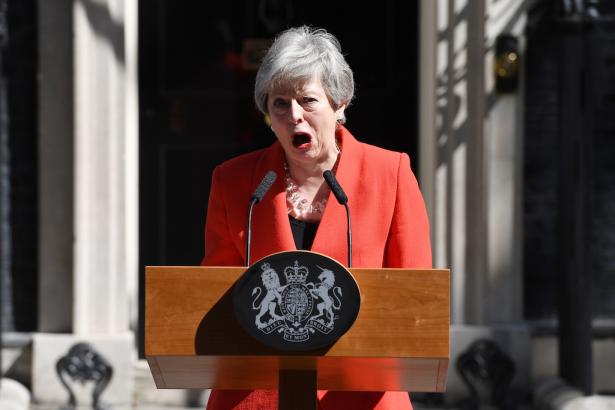Not with a bang nor a whimper, but a wretched sob, Theresa May’s premiership came to an end with scarcely controlled weeping, as she tried to finish her resignation speech, broadcast live to millions. She was forced out not by poor European election results for the Conservatives — though the results, released Sunday, will surely show complete humiliation for her party — but by her own party, terrified she was harming their chances of ever catching a sniff of power again, or of enacting the Brexit the vast majority of Tories still want, in any form.
Even before her resignation, centrists were lauding Theresa May for dealing with a tough situation well. Brexit wasn’t the easiest of loads but could very well have been dealt with far better had she been willing. May received a particularly easy time from the British media, however, which described her as “a safe pair of hands” and diligently failed to interrogate her history or culpability for policies on immigration, austerity, race, and women’s rights.
The reality is that she will go down in history as one of the worst British premiers. As a member of Parliament she voted against reducing the age of consent for gay people, against gay couples adopting, and failed to show up for many of the votes repealing Section 28, a draconian law that banned even the mention of homosexuality in schools.
But it was May’s six-year turn as Home Secretary starting in 2010 that really saw her come into her own. Where Labour had previously been forced to sack draconian home secretaries one after the other, May was impervious to scandal. It was clear that her attitude and that of the Conservatives was to legitimize state cruelty. No secret was made of the deportation centers that held people in appalling conditions, privatized and outsourced to some of the worst-performing companies like G4S and Serco.
May’s plan was to be cruel in policy while keeping her head down and refusing to respond to scandal. It worked for her. In 2011, I put £20 on her becoming the next prime minister. The plan was clear: May was the closest minister to David Cameron, after George Osborne. If she could hold on and refuse to resign, she could accumulate media exposure and get a reputation as calm and capable. It worked: some journalists described her as “a safe pair of hands.”
Her habit of ignoring crises was best shown in the Windrush Scandal that saw thousands of migrants who arrived in Britain young or were born here denied the rightful legal documents, then deported, detained or threatened with deportation afterwards. At no point did May or other ministers mention the fact that it was May who was in the Home Office at the time and responsible for the whole sorry mess. Instead she fell silent for several days until Amber Rudd, who had succeeded her as home secretary, resigned to take the blame. People discussed Tony Blair’s “Teflon” qualities, but absolutely nothing seems to stick to May, including all of these senseless and cruel deportations.
Her legacy then is one predominantly marked by racism and deportations. But May apparently always wanted to be prime minister. She was reportedly annoyed as a young analyst at the Bank of England when Margaret Thatcher won the job, as it meant she couldn’t be the first British female premier. She got her prize, but at what cost?
That May’s ultimate reign ends in tears is fitting given it started in the same way. The tears weren’t hers, but Andrea Leadsom’s, her only contender in the peculiar MP-only voting system Tories use to choose leaders, after Leadsom had told a newspaper she felt she was better placed to be PM “as a mother,” before withdrawing from the race in tears on her doorstep. That May became prime minister purely by waiting for all other foes to fall away gave a clue to the tactics she would use in Number 10 Downing Street, but they have now blown up in her face. Her entire premiership has been scarred by Brexit. Nothing she does seems to please anyone. This isn’t because it’s impossible to find a compromise, but because May’s offers have been put together with no parliamentary input.
It has been pointed out extensively that May has no friends, and as a result looks endlessly awkward when speaking on camera. She is even worse in person, robotically reading from her notes in one-on-one meetings and endlessly grimacing while meeting the public. May constantly believed that she, a person with no true parliamentary friends, who refuses to negotiate with anyone, even her own side, could threaten Parliament if she didn’t get her withdrawal agreement past. Time and again, it was defeated, time and again she promised that the EU would renegotiate, time and again they told her to get lost, as did the MPs in the her own parliament.
In the end, everyone bar her husband was telling her to get lost (no official statement from him yet), and she was forced to admit the game was up.
It’s difficult to feel any sympathy for a politician who has presided over racist and xenophobic immigration policies and the immiseration of countless lives under austerity. Any tears shed should be reserved for the victims of her policies: the people deported from their homes, the women and children with nowhere to go because of cuts to domestic violence shelters. On the morning of May’s resignation, more than 120,000 children were living in temporary housing, designed for short term emergency use — a rise of 80 percent since 2010.
Theresa May’s tears should have been shed for any of those people affected by her decisions, but were, in the end, only for herself.
Dawn Foster is a Jacobin staff writer, a columnist for the Guardian, and the author of Lean Out.
Our new issue, on the housing crisis and capitalism, is coming soon. Get a discounted subscription today.


Spread the word